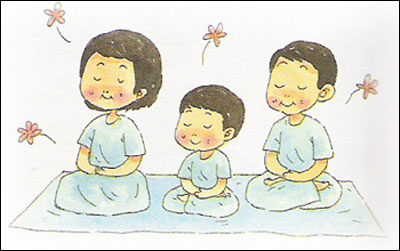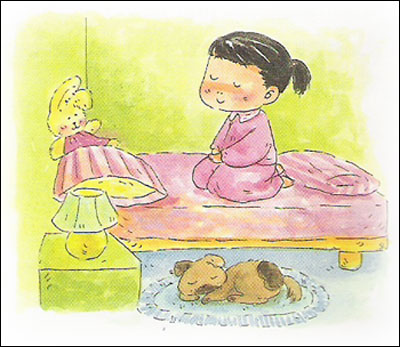Where do Children’s Habits come from?
After parents learn that good children must not be troublesome, ignorant, or careless towards others, the question now is, how do parents cultivate these traits in their children?
Good qualities are implanted in children through their cultivation of good habits.
Habits are familiarity, or each person’s individual behavior. They are developed with repetitive thoughts, speech, and actions. These repetitive activities, in turn, influence how good or bad we are.
If parents allow their children to repeatedly think, speak and act unwholesomely, regardless of the scale, their children will become accustomed to wrongdoing, which cultivates bad habits. Chances are the children will grow into bad individuals.
On the contrary, if parents teach their children to repeatedly engage in wholesome deeds, regardless of the scale, they will become accustomed to doing the right thing until it becomes a habit. And they will become good individuals in the future.
People repeatedly think about, speak about, and cat upon three different things:
1) The four requisites, which are clothing, food, shelter, and medicine.
2) Our assignments
3) Our daily routine.
Habits develop from the way we utilize the four requisites. For example, three children who are fed using different routines will develop different habits:
The first child: The mother feeds the child irregularly. The child cries whenever he is hungry and not fed on time. He becomes easily irritated and screams when he needs attention. He will develop a habit of violence and aggression to get what he wants. It is like the parents have a tiger baby to raise.
The second child: the mother feeds the child all the time. Even when the child is not hungry, he is fed milk. He becomes obese but happy. However, he will develop a habit of sluggishness and indolence. In this case, the parents have a baby pig to raise.
The third child: the mother feeds the child according to a schedule. The child develops a habit of punctuality and will grow up to be healthy, reasonable, happy, a good decision maker, and will be easy to care for. In this case, the parents have a sage to raise.
Good and bad habits come from the child’s repetition of inking, speaking, and acting. In particular, it is how they utilize the four requisites, how they work, and how they conduct their daily activities.
Parents can instill wholesomeness, intelligence, and compassion towards others by teaching their children respect, discipline, and endurance, with regards to their use of the four requisites, their assignments, and their daily activities. The child will, in turn, develop good habits (the three characteristics).
Wisdom is can be divided into worldly wisdom and Dhamma wisdom.
Raising a child to be smart
Parents who want their children to be smart can cultivate wisdom by teaching them respect. Respect is a sign of one’s appreciation towards the true virtue or benefit of a person or object.
Wisdom is can be divided into worldly wisdom and Dhamma wisdom.
Worldly wisdom is wisdom or knowledge acquired through education. It is required to make a living. However, without morality to curb one’s knowledge, children may misuse it. For example, a pharmacist may produce and traffic heroin instead of conducting research for a new medication. Worldly wisdom must work together with Dhamma Wisdom.
Dhamma wisdom in deciding what is right or wrong, good or bad, merit or demerit, and appropriate or inappropriate. Children gain this knowledge from Buddhist teachings. In practice, parents must teach them to respect and listen to the elders’ words of wisdom and life experiences, and learn about the ever-changing world and people.
Dhamma wisdom cones from seven sources. When one respects these sources, one will gain wisdom:
1. Respect for the Lord Buddha.
2. Respect for the Dhamma.
3. Respect for the Sangha (monastic community).
4. Respect for Education.
5. Respect for Meditation.
6. Respect for Non-Recklessness.
7. Respect for Greetings.
The more parent teach their children to see the virtues of these seven sources, the more Dhamma wisdom their children will gain.
Children are very fortunate if they are born to parent who have studied Dhamma from the seven sources of wisdom and are prepared to pass down this wisdom to their children before they get married. Parents will have a sage as a child. Children wil have parents who are capable of teaching them Dhamma wisdom. Future generations will be wholesome and bring prosperity to the family.
Respect for Meditation.
Raising a child to be Wholesome
Wholesome children have parents who have taught them to have discipline in both their worldly lives and in Dhamma. Discipline is taught in conjunction with their use of the four requisites, their assignments, and in their daily routine. Parents must set an example through their own behavior.
The 4 Worldly Disciplines are:
1. Discipline with speech.
To teach a child to have discipline in speech, parents must speak properly (politely, truthfully, and with good intentions). Parent must point out the negative consequences of lying, i.e., it undermines the quality of the mind and causes forgetfulness.
2. Discipline with time.
Teaching a child to have discipline with time is to teach them to wake up, eat, and sleep on time.
Waking up on time means getting up early in the morning to keep a child from sleeping all the time. In particular, if a girl wakes up late, it could break up her marriage in later life.
Eating on time means that a child must eat when a meal is scheduled. If children come down with gastritis, chances are they will have symptoms for the rest of their life, i.e. they will develop a stomach ache whenever they are under pressure.
Sleeping on time means going to sleep in the early evening. When children go to sleep late, they will not want to get up early. When their parents wake them up, they will bargain for more sleep, starting their day with an argument. They will become deceitful people.
3. Discipline with cleanliness.
Dirty children are not well received in society. Parents have to teach them how to maintain cleanliness, such as how to take a bath by using less water, soap and time, but still turn out clean.
4. Discipline with organization.
Children who lack organizational skills tend to have conflicts when they work with others. They cannot follow outlined procedures or prepared and complete their work, resulting in difficulty of achieving success.
The Dhamma Disciplines are rooted in the Five Precepts:
Children that don’t keep the f8ive Precepts will experience problemsi n their adult life, such as in their marriage. And if life is unfavorable, they may commit a crime in the future:
1) If they do not keep the first Precept (No taking or harming of lire) then: They might commit a murder.
2) If they do not keep the second Precept (No sexual misconduct) then: They might engage in prostitution.
3) If they do not keep the third Precept (No lying divisive speech, idle chatter, or harsh words) then: They might commit fraud.
4) If they do not keep the fourth Precept (No lying, divisive speech, idle chatter, or harsh words) then: They might commit fraud.
5) If they do not keep the fifth Precept (No consumption of intoxicating substances, such as alcohol or drugs) then: They will exacerbate the breadth of the roads to ruins, (Apayamukha), i.e. gambling, alcohol consumption, nightclubbing, etc.
Meditation - Related Articles
" />
" />
" />
" />
" />
" />
" />








